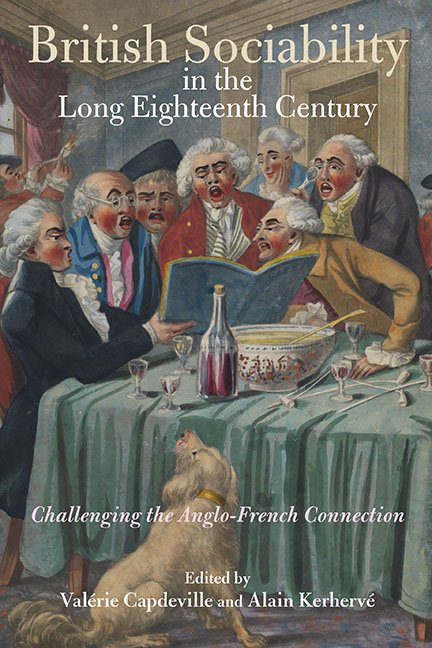Book contents
- Frontmatter
- Contents
- List of illustrations
- List of contributors
- Foreword
- Acknowledgements
- Introduction
- Part 1 Emergence of new political and social practices
- Part 2 Competing models of sociability
- 5 ‘Amateurs’ vs connoisseurs in French and English academies of painting
- 6 Masonic connections and rivalries between France and Britain
- 7 Competing models of sociability: Smollett's repossession of an ailing British body
- 8 A theory of British epistolary sociability?
- 9 Gender and the practices of polite sociability in late eighteenth-century Edinburgh
- Part 3 Paradoxes of British sociability
- Conclusion
- Bibliography
- Index
9 - Gender and the practices of polite sociability in late eighteenth-century Edinburgh
from Part 2 - Competing models of sociability
Published online by Cambridge University Press: 18 September 2019
- Frontmatter
- Contents
- List of illustrations
- List of contributors
- Foreword
- Acknowledgements
- Introduction
- Part 1 Emergence of new political and social practices
- Part 2 Competing models of sociability
- 5 ‘Amateurs’ vs connoisseurs in French and English academies of painting
- 6 Masonic connections and rivalries between France and Britain
- 7 Competing models of sociability: Smollett's repossession of an ailing British body
- 8 A theory of British epistolary sociability?
- 9 Gender and the practices of polite sociability in late eighteenth-century Edinburgh
- Part 3 Paradoxes of British sociability
- Conclusion
- Bibliography
- Index
Summary
IN 1829 WALTER SCOTT contributed his recollections of the eighteenthcentury Scottish songwriter and hostess Alison Cockburn to an anthology of Scottish songs. He suggested that ‘she maintained the rank in the society of Edinburgh which French women of talents usually do in that of Paris’, and that ‘the vieille cour of Edinburgh rather resembled that of Paris than that of St James's’, in laying aside expense and formality to entertain small circles of the Scottish literati at the heart of the Edinburgh Enlightenment. This representation of Cockburn draws upon the tensions experienced in early nineteenth-century Edinburgh around the participation of aspiring literary women in forms of mixed sociability. For those who observed and wrote from this world, both the French salonniere and the English bluestocking were constant points of reference. In 1817, Elizabeth Isabella Spence wrote of her visit to the autobiographer and hostess Eliza Fletcher as an encounter with ‘the Mrs Montague of Edinburgh, her house being the centre of all that is literary, amiable and distinguished’. But when, in October 1820, John Wilson, editor of Blackwood's Edinburgh Magazine, suggested that in the years before his periodical was established in 1817, ‘bluestockingism was in its cerulean altitude’, he did so in the context of a reactive redefinition of the Edinburgh republic of letters as one to be led by masculine critical authority. That redefinition began with the foundation of the Edinburgh Review in 1802, but continued to be asserted throughout this period. These reference points deserve to be understood against the growth of and shifts in polite urban sociability in the eighteenth and early nineteenth centuries. Located in the intermediate spaces between formal public and domestic worlds, and increasingly politicised and diverse, sociable practices need to be understood within their cultural and national contexts, and alongside changing patterns of association in a more clearly public setting.
The history of eighteenth-century salon culture, across France, Britain and Germany, has been the subject of much recent historical discussion, following, in particular, Dena Goodman's discussion of French salons as evolving from aristocratic institutions into sites of sociability, led by women, that embodied the principles of the Enlightenment, allowing women some share in the shaping of transformational ideas, even though they were excluded from other public institutions.
- Type
- Chapter
- Information
- British Sociability in the Long Eighteenth CenturyChallenging the Anglo-French Connection, pp. 163 - 182Publisher: Boydell & BrewerPrint publication year: 2019

